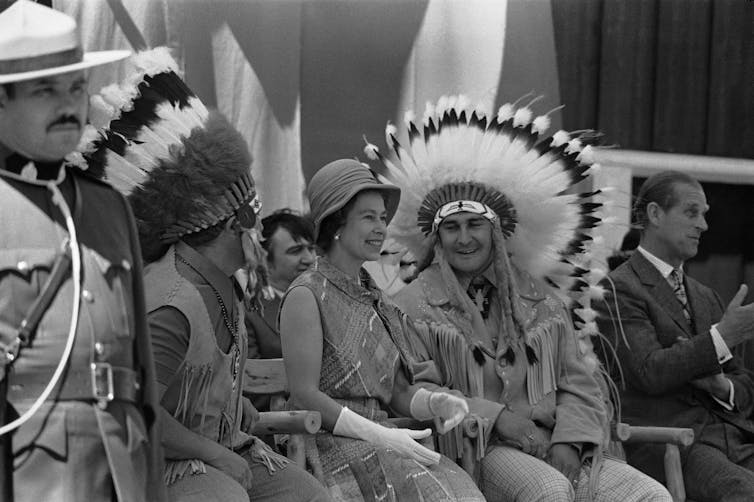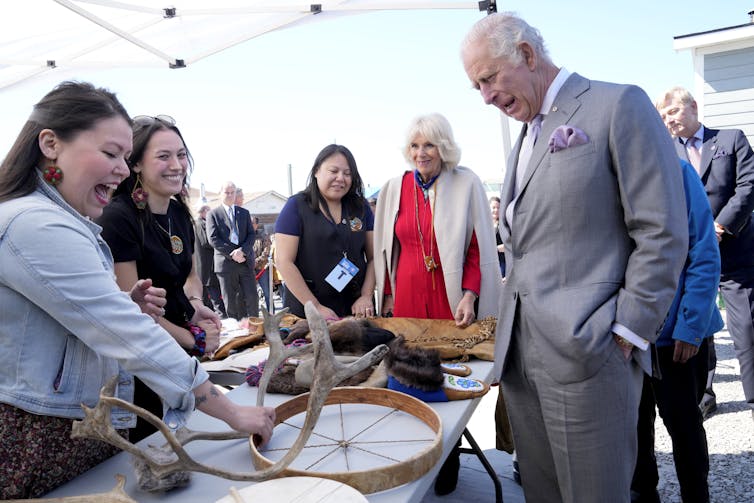About the Queen and the Crown’s crimes and how to talk about the unmourned — Podcast
at Don’t call me resilient, we’ve been busy planning the fourth season of the podcast, which is due out in November. We’re even starting to think about Season 5. But we decided to shut down production to talk about something we felt we couldn’t ignore.
We watched this incredible spectacle surrounding the death of the Queen and the public outpouring of support and love for the British monarchy.
Here in Canada, Queen Elizabeth was the official head of state and her funeral this week was declared a federal holiday. In Ontario, the Secretary of Education ordered schools to observe a minute’s silence “to recognize the profound impact of Queen Elizabeth II’s lifelong and unwavering dedication to public service.”
And yet next week these same children will explore the history of India’s Residential Schools and the immense enduring damage to this system – started and long supported by the Crown.
Amid this outpouring of love and sorrow for the Queen — and the monarchy she represented — not everyone is feeling it. Not everyone wants to mourn or honor her or what she represents.
And there are many reasons for that.
For example, First Nations Assembly leader RoseAnne Archibald told CTV News that the royal family should apologize for the Crown’s failure… “particularly for the destructive effect of colonization on First Nations people.”

(AP photo)
Another example came from Uju Anya, a professor at Carnegie Mellon University, who posted a tweet identifying the Queen as overseer of a “thieving, raping genocidal empire.”
To further explore these ideas, we reached out to two scholars who are regular contributors Don’t call me resilient. Both say the Queen’s death could be a binding moment of disagreement for people from current and former colonies.
Veldon Coburn is an assistant professor at the Institute of Indigenous Research and Studies at the University of Ottawa, where he teaches a class called Colonialism, Territory & Treaties. He is Anishinaabe, Algonquin of Pikwàkanagàn First Nation and Associate Editor of capitalism and expropriation.
Cheryl Thompson is Assistant Professor of Media and Culture at the School of Performance and Director of the Laboratory for Black Creativity at Toronto Metropolitan University. She is the author of Uncle: Race, Nostalgia, and the Politics of Loyalty.
Listen and follow
You can listen or follow Don’t call me resilient on Apple Podcasts, Google Podcasts, Spotify or wherever you listen to your favorite podcasts. We’d love to hear from you, including ideas for future episodes. Join the conversation TwitterFacebook, Instagram and TikTok and use #DontCallMeResilient.
In conversation
Queen Elizabeth II: The politics of national mourning left no room for dissenting voices
Decolonizing The Queen’s Funeral: Why It Shouldn’t Be A National Holiday In Canada
Colonialism was a disaster and the facts prove it
Severing ties to the monarchy could be on the horizon in Canada
Additional Sources
“No, I do not mourn the Queen” Toronto Star by Shree Paradkar

THE CANADIAN PRESS/Paul Chiasson
The series is produced and hosted by me, Vinita Srivastava. Our Executive Producer is: Lygia Navarro and Jennifer Moroz is Consulting Producer. Call our newest collaborators: Dannielle Piper is a producer. Rukhsar Ali is an assistant producer. Rehmatullah Sheikh is our sound engineer. Ateqah Khaki helps with marketing and visual innovation. And Scott White is the CEO of The Conversation Canada.